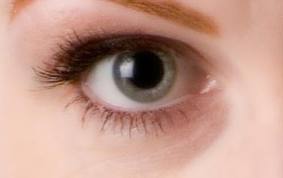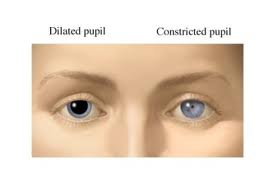Dilated Pupils Definition
Page Contents
For those who would like to know as to what is a dilated pupil, must be made aware of the fact that dilating pupils are a kind of a physiological response to a stimulus that is actually underlined by involuntary reflex actions. It is characterized by the changes in the size of the pupil.
Light conditions acts as a stimuli for uneven pupil dilation. It may also be a case of pupil dilation attraction, in which case the pupil expands when it is interested in a particular subject. Sexual orgasm may also serve as a stimulus for pupil dilation. In such cases, one may suffer from dilation of the pupils due to a Pavlovian response to some kind of stimulus. This kind of a pupillary response usually increases with age and aged people suffer from fixed and dilated pupils.

Picture 1 – Dilated Pupils
Source – www.radiantpics.com
A fixed and dilated pupil is actually known as Mydriasis. It is basically the result of an excitation of the iris which causes an opening up of the papillary aperature. Dilated pupils in children are also quite common. There may be very many causes of dilated pupils but neurological problems are the most common cause of the same. Uneven dilated pupils may be a sign of a serious condition which may be life-threatening if not treated in time.
Dilated Pupils Symptoms
The symptoms of dilated pupils depend on the underlying cause of the same. It may be accompanied by symptoms associated with other causal agents and disorders. Since it is associated with neurological problems, it may lead to nausea and vomiting, slurring of the speech, sub consciousness, tachycardia, and numbness. It may also be characterized by a lack of alertness or consciousness, unresponsiveness, changes in behavioural patterns leading to a state of confusion, or giving rise to delusions and hallucinations.
One may also suffer from severe headache accompanied by eye pain and other ophthalmologic problems. One may also suffer from one dilated pupil, which is also known as unilateral dilation of the pupils. A dilated pupil in severe cases may also be accompanied by an inability to control one’s bowels and bladder, and numbness or even paralysis. Life-threatening cases of dilation may be signalled by serious problems such as coma, muscle weakness, and shocks.
Dilated Pupils Causes
Usually a dilated pupil is caused due to a stimulus to light, wherein the pupils constrict when light brightens and dilates when light dims. Pupils dilate to allow for more light to enter the eyes, so that one is able to see objects even in a poorly lit area. However, if one wants to know what causes dilated pupils other than the natural cause, one must be enlightened with the fact that pupils always dilated may have other causes. Emotions such as fear, anger, sexual orgasm and attraction may also fall under the category of naturally induced causes of dilated pupils. Dilated pupils ecstasy is also a cause of ecstasy and overexcitement that one may experience while having a strong libido. The basic reason cited behind the constant dilated pupils is the release of oxytocin. The opposite of dilated pupils is known as Miosis.
Some of the other reasons for dilated pupils may include neuropathic disorders, trauma, medications and drugs, poisoning, any kind of injury or the spinal cord that may give rise to neurological problems.
Nervous Problems
The neuropathic cause behind dilation of the pupils is the sympathetic stimulation of α1 adrenergic receptors involving the radial muscle and the parasympathetic stimulation involving the circular iris muscle cause the pupils to dilate. Moreover, the over activity of the SNS and the disruption of the parasympathetic nerve supply, cranial nerve disorder, and an elevated intraocular pressure may be cited as the cause of dilation and constriction of the pupils. Complications involving the CNS such as stroke, epilepsy may also be cited as a significant cause of dilated pupils or mydriasis. Such neurological problems actually cause dilated pupil in one eye.
Trauma
A dilated pupil may be caused by any kind of trauma such as a damage of the nerves controlling the activities of the iris, an injury to the head or the eye, and iris sphincter. All these factors highly affect the consensual reactivity of the eyes to light and cause fixed and dilated pupils after trauma. Damage to the ocular nerve is actually responsible for causing nonparallel or uneven dilation of the eyes.
Medications & Drugs
Picture 2 – Dilated and Constricted Pupils
Source – www.yourdetoxore.com
Medicines and drugs prescribed for treating certain diseases may cause a dilated pupil, but it may also be triggered by the side-effects of the same medications and drugs. Such medications are basically cold and cough medications, decongestants, and other illicit dilated pupils drugs or stimulants such as marijuana, LSD, and cocaine. Alcohol is also an addictive substance that is responsible for causing alcohol dilated pupils.
Drugs that cause dilated pupils include decongestants like pseudoephedrine, amphetamines and methamphetamines, antihistamines such as chlorpheniramine and diphenhydramine, and fenflumarine. Antidepressants like SNRIs, SSRIs, and MAOIs are also known to keep pupils dilated. Other medications may take into account antichlolinergics like hyoscyamine, scopolamine, tropicamide and atropine.
Hallucinogens such as psilocybin, LSD, mescaline, tryptamines, phenethylamines, also cause mydriasis or dilated pupils by stimulating the serotogernic 5-HT2A brain receptors. Along with these, opioid withdrawal and rebound also cause both mydriais and miosis.
Moreover, medicinal eye drops known as mydriatics that are administered to patients undergoing an eye test, may also cause the pupils to be dilated. Such an eye test conducted with the administration of anticholinergic drug called tropicamide.
Toxication
Biological and chemical poisoning caused due to certain kind of plants like black locust tree, and benzene, toxic mushroom, jimsonweed, chloroform and even jet fuel are highly responsible for causing dilated pupils.
Other Serious Causes
Other serious causes of a dilated pupil, which are by nature life-threatening, include brain aneurysm, skull fracture, brain tumour, diabetes, stroke, and cerebral edema or swelling of the brain. Such cases are actually responsible for causing dilated pupils concussion, and fixed dilated pupil. When one finds one pupil dilated more than the other, or pupils dilated different sizes, one may attribute the same to these serious causes.
Dilated Pupil Eye Exam
Dilated pupil test is also known as mydriasis and is conducted with the administration of tropicamide which helps in the observation of retinal complications and reduction of the occurrence of ciliary muscle spasm. Pupil dilation drops are used in with such a antichlorigenic content. Although it causes Photophobia but it is temporary in nature. Neuroanantomy aids the diagnosis of dilated pupil by examining the pathway and the nature of cranial nerves. Along with it, one may also have to go for a diabetic neuropathy, a slit lamp test, mecholyl test, arteriogram, spinal tap, a visual field examination or even a CT scan or an MRI.
Dilated Pupil Treatment
The treatment of dilation of the pupil depends on the age, specific cause; other associated underlying disorders or diseases, and the study of one’s medical history. It basically entails the treatment of the underlying causes which may require the need for intensive care and hospitalization. One may even require surgical intervention for dealing with issues related to intra-cranial pressure, and other neurological problems.
The treatment for dilated pupils also entails drug-intake management, medical supervision, counselling, rehabilitation, and other measures aimed towards taking proper care of one’s health and other measures for preventing the occurrence of injuries. For instance, cocaine and marijuana dilated pupil can be treated by restricting oneself to get addicted to the same.
Although dilated pupil is not a serious health concern, yet a prompt and proper diagnosis and treatment is essential for ascertaining the underlying causes of the condition since the causes may themselves jeopardise one’s life.
References :
http://en.wikipedia.org/wiki/Pupillary_response
http://www.bettermedicine.com/article/dilated-pupils
http://www.ehow.com/facts_5974976_eye-dilation_.html
http://www.ehow.com/about_5042633_causes-dilated-pupils.html


this was the best site i found about one dialated pupil. thank you.